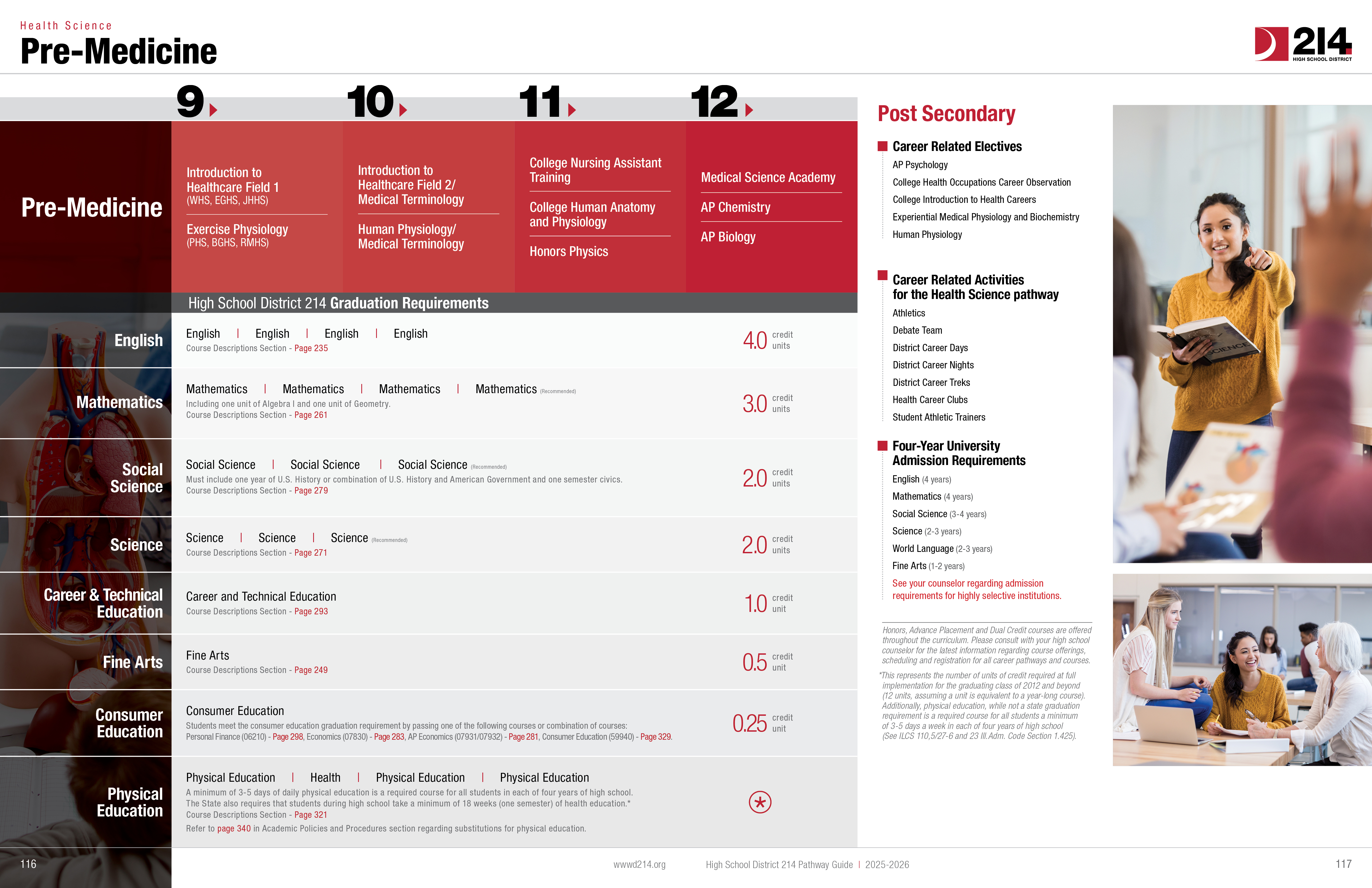Pre-Medicine
-
Students in this pathway take a variety of courses, including: Introduction to Health Careers, Medical Terminology, and College Nursing Assistant Training. As part of the program, students also have the opportunity to earn a State of Illinois Certified Nursing Assistant (CNA) certificate directly through their high school. Additionally, Juniors can apply to participate in Medical Science Academy (“Med Academy”) during their Senior year, which is a program designed to provide an advanced focus on health sciences and prepare students for future careers in healthcare.
Students wanting to pursue pre-medicine coursework at the college level can expect to take a set of required science courses to prepare them for medical school. These typically include: biology, chemistry (general and organic), physics, biochemistry, math, and statistics. Pre-Medicine is not a major itself, but rather a track within a chosen major that ensures students take the necessary science courses to be eligible for medical school admission and the MCAT exam.
The education requirements for careers in the medical field vary widely depending on the role. Here are examples of careers at different education levels:
Four-Year Degree (Bachelor’s Degree)
- Registered Nurse (RN): Many RNs pursue a Bachelor of Science in Nursing (BSN), though some enter the field with an associate degree.
- Health Services Manager: Often requires a bachelor’s degree in healthcare administration or a similar field.
- Dietitian or Nutritionist: A bachelor’s degree in dietetics, nutrition, or a related area is the standard requirement.
Master’s Degree
- Physician Assistant (PA): Requires a Master of Science in Physician Assistant Studies.
- Occupational Therapist (OT): A master’s degree in occupational therapy is typically required.
- Speech-Language Pathologist: Requires a master’s degree in speech-language pathology.
- Nurse Practitioner (NP): Requires a Master of Science in Nursing (MSN).
Doctorate or Professional Degree
- Physician (MD or DO): Requires a Doctor of Medicine (MD) or Doctor of Osteopathic Medicine (DO) degree, followed by residency.
- Pharmacist (PharmD): Requires a Doctor of Pharmacy degree.
- Physical Therapist (PT): Requires a Doctor of Physical Therapy (DPT) degree.
- Dentist (DDS or DMD): Requires a Doctor of Dental Surgery (DDS) or Doctor of Dental Medicine (DMD) degree.
- Veterinarian (DVM): Requires a Doctor of Veterinary Medicine degree.
Medical Science Academy
Medical Science Academy at District 214 is a specialized career pathway program designed to prepare high school Seniors for careers in the medical and healthcare fields. It is part of District 214’s Career Pathways initiative, which provides students with opportunities to explore various industries through hands-on learning, coursework, and real-world experiences.
Key Features of the Medical Science Academy:
- Healthcare-Focused Curriculum: Students engage in a year-long study of anatomy and physiology, including hands-on experience in a cadaver lab. The curriculum also incorporates interactive labs and guest speakers, providing practical insights into healthcare topics.
- Dual Credit Opportunity: Students earn college credit for anatomy and physiology courses through Harper College. These credits are transferable to many colleges and universities, giving students a head start on their postsecondary education.
- Internships and Clinical Experiences: During the spring semester, students participate in a 60-hour internship that includes job shadowing and clinical experiences with local hospitals, clinics, and/or other healthcare organizations.
- Career Pathways: The program prepares students for diverse healthcare careers, whether they require certification, a two-year degree, or advanced education.
Medical Science Academy equips students with both academic knowledge and practical skills, making it an excellent choice for those interested in pursuing healthcare-related fields. Juniors who are interested can learn more about the application process here.
Work Based Learning Experiences in Pre-Medicine
Students have the opportunity to participate in internship and apprenticeship programs to affirm their interest in a career in health science fields.
Internships are available to students beginning the summer before their Junior year for students who have taken at least one career pathway course in the health sciences pathway. Students have been placed in hospitals, medical offices, dental offices and medical labs.
Apprenticeship opportunities are available to seniors (applications are open from November through January of their junior year) who are interested in getting on-the-job paid training with an employer while continuing their coursework in their career area of interest. District 214 offers apprenticeship opportunities in the areas of:
- Athletic training
- Biomedical technology
- Certified nursing assistant
- Pharmacy technician
- Veterinary technician
The applications for these work-based learning programs can be accessed in students’ SchooLinks accounts under “Programs”


